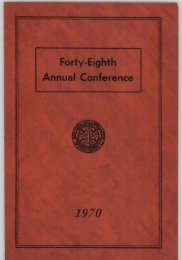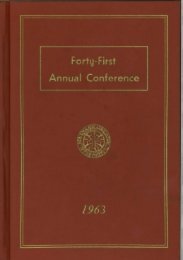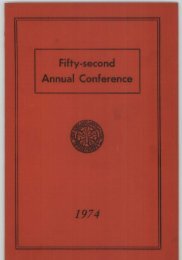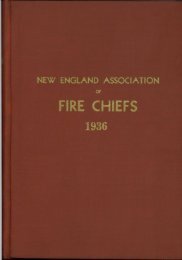NEAFC 32nd Annual Conference.pdf - New England Association of ...
NEAFC 32nd Annual Conference.pdf - New England Association of ...
NEAFC 32nd Annual Conference.pdf - New England Association of ...
Create successful ePaper yourself
Turn your PDF publications into a flip-book with our unique Google optimized e-Paper software.
NEW’~ENGLAND 2~kSSOCIATION OF’ FIVE CHIEFS<br />
it is to have a broken pipe burning. As long as it is. burning, it may involve<br />
,other structures, buildings, etc., but it will not create a large flash fire or<br />
explosion..that will cause much damage.<br />
So that if’ you :~ee these cyclinders at bulk plants, and th~ piping is burning,<br />
t-he thing, to do is to. let it burn, and try to cut <strong>of</strong>f the source <strong>of</strong> the fuel. If<br />
can ~ do that, and keep the storage tanks, cool, you will probably lick the fire<br />
easily. : ¯<br />
As a matter <strong>of</strong> fact, I don’t know <strong>of</strong> any occasion, other than the very<br />
remote instance, where you would have a reason for extinguishing a propane<br />
fire. And, if you do have occasion for it, I think that you are probably acquainted<br />
with the proper method <strong>of</strong> putting out.<br />
I will mention that, personally, I think that dry chemicals, do an excellent<br />
job. Fog is also effective. The chemicals seem to. be more spectacular with<br />
regard to control.<br />
First-aid equipment, <strong>of</strong> course, is ~:" the greatest piece <strong>of</strong> equipment, as far<br />
as propane fires are concerned, because if they can be taken care <strong>of</strong> when small<br />
and shut <strong>of</strong>f, you are in business. If the thing progresses, to. the point where<br />
the bulk plant is fairly well gone, the best you can d9 is. cool the tanks, shut<br />
them <strong>of</strong>f, isolate the fuel,and let the thing go up in smoke, which it will.<br />
A propane fire, incidentally, will burn in a small area, in a short time, and<br />
straight up. There is no spattering or scattering <strong>of</strong> the fuel gas, such as there<br />
would be with gasoline.<br />
There is one other problem that you, as fire fighters, may have to face,<br />
and that involves the .dispersion <strong>of</strong> unburned fuel. For instance, if there has<br />
been a leak in an area, a basement or a building; or any yard is. filled with ~anburned<br />
fuel, then, <strong>of</strong> course, it will be your duty to. take care <strong>of</strong> that situation.<br />
Now, by normal ventilation, a small basement, or a building, can be cleared<br />
<strong>of</strong> fuel.<br />
The No. 1 thing to think <strong>of</strong> in this case is ,to kill all sources <strong>of</strong> ignition.<br />
Propane cannot be ignited by jarring or thumping, or electricity, unless there<br />
is a spark. It has to have a spark, or an open flame. The ignition temperature<br />
is 890 to 1,000 degrees, before itcan be touched <strong>of</strong>f.<br />
In the case .<strong>of</strong> an area filled with unburned fuel, all smoking, matches,<br />
flames, pilots, should be extinguished and the building allowed to ventilate itself,<br />
by opening all the windows.<br />
If you have available an explosion pro<strong>of</strong> boiler or fan, that can be used<br />
to advantage to speed up the ventilation <strong>of</strong> any area, but the motor, <strong>of</strong> course,<br />
must be explosion pro<strong>of</strong>, too. It is unlikely that an ordinary fire company<br />
would have that type <strong>of</strong> equipment, so it can be done in a gravity basis. The<br />
only real way to tell whether or not~ an area is. free ~<strong>of</strong> ,fuel is to use some type<br />
<strong>of</strong> explosion meter that indicates., whether or not combustible gas, is present<br />
in sufficient quantity to. ignite.<br />
Generally ~peaking, with propane, when the odor is:gone, the gas. is. gone.<br />
However, the bdor may linger a bit beyond the fuel, but you are on the<br />
safe side; if the odor is out, usually the gas is out. The odor is. non-fatiguing;<br />
in other words, you don’t become used to it. You can smell, as long as it is<br />
=there. ~. ’=- " - ~-~"..<br />
Now, Gentlemen, that is all that I .~aye fO{ .you this morning, unless you<br />
have some qugs=_:tions for,:ome. ,. ~ .









